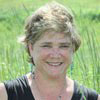If you can't see this video, click here. Note, also, that you can read the transcript of the video on the TED Talks site, available in multiple languages.
Where is it hardest for you to be vulnerable? For me, it's the emotions that are difficult. Growing up, I had an alcoholic step-father and I learned not to show emotions to anyone, essentially to squelch those emotions, to deny them. It's still hard today to allow my writing to touch the emotional depths that make for great storytelling. When an emotional scene succeeds, it's because I've allowed myself to be the most vulnerable.
As Brene Brown puts it:
This is what I have found: to let ourselves be seen, deeply seen, vulnerably seen; to love with our whole hearts, even though there's no guarantee -- and that's really hard, and I can tell you as a parent, that's excruciatingly difficult -- to practice gratitude and joy in those moments of terror, when we're wondering, "Can I love you this much? Can I believe in this this passionately? Can I be this fierce about this?" just to be able to stop and, instead of catastrophizing what might happen, to say, "I'm just so grateful, because to feel this vulnerable means I'm alive."
To write vulnerable, it means I'm alive.
Note: Brene Brown has several books available on these topics. See here for more info.
----
Darcy Pattison blogs about how-to-write at Fiction Notes and blogs about education at CommonCoreStandards.com






5 comments:
Darci, thanks for the thought-provoking article. I don't always mind being vulnerable with my own stuff, but when it bleeds (as it inevitably seems to) to other people, then it's not just about me anymore. I don't want to exploit other people,or their relationship to me-- no matter how dysfunctional--for the sake of my self-confession. It's a tricky ground, isn't it and yet, for sure, adds depth to our writing.
Darci, thanks for turning me on to that video! Brene Brown is fantastic. What a smart, funny lady!
"You can't selectively numb emotion." When you choose to numb some feelings (the bad stuff--shame, fear, grief, etc.) and not others, you are numbing your true happiness and joy as well. That's powerful stuff.
I believe it holds true for writing as well. Sure, we have to think about other people (like Julie mentioned), but I don't think we have to try and publish everything we write. Sometimes there's a joy that comes from letting emotions spill onto the page. But I think the main point here is that we should live our lives authentically in every way, and the only way to do that is by being vulnerable. I admit I don't live a fully authentic life, but I know people who do, and they are happy and respected. It's something to work toward for sure. I guess the key is to figure out what is holding us back.
Angela, you make a great point of finding a venue to write-- not everything has to be published. Julia Cameron also does a beautiful job extolling the healing and cleansing virtues of writing as well.
I’m so glad I let myself take the 20 minutes to watch this. It really spoke to me in a lot of ways.
From a writing standpoint, I know that what makes good writing compelling is often that the author is willing to share it all, including the dark or embarrassing stuff. As someone who holds her cards very close to the vest, I think that’s what’s kept me from writing more often for publication: it’s hard to be that vulnerable.
Anyway, what a great video. Thanks Darcy for your openness and for the exposure to a great talk.
I also find that sometimes when you are at your most vulnerable, it is actually hard to write about the subject--the emotions are too raw, and for me, it comes out stilted. I find time actually helps me to be more vulnerable in my writing--I know it doesn't make sense, but it's just the way it's been for me. :)
Post a Comment